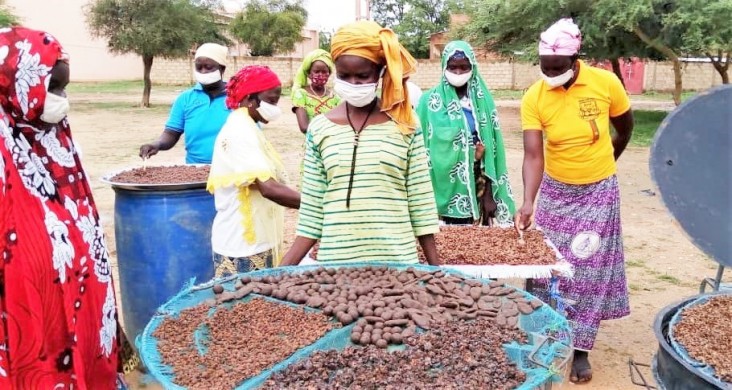Speeches Shim

Since 2017, there has been an increase in the number of terrorist attacks and assassinations targeting male community members across the Komondjari Province in the Est region, especially in areas that border Niger. Many women who have lost their husbands arrived in the Gayéri, Foutouri, and Bartiébougou communes without any sources of income to care for their children. Their social and financial fragility make them vulnerable to recruitment from armed groups, who offer financial incentives in exchange for carrying weapons or providing food or information about targets.
USAID's Office of Transition Initiatives (OTI) Burkina Faso Regional Program (BFRP) partnered with a provincial women's organization, Coordination Provinciale des Organisations Féminines de la Komondjari, to provide a training on economic opportunities for 60 vulnerable women from the Gayéri, Foutouri, and Bartiébougou communes. From August 6-28, 2020, women learned new techniques for producing high-quality soumbala, a popular local condiment that is used in dishes like rice and soups throughout West Africa. Although it is customary for women to produce soumbala using African locust beans, this training showed how other locally available products, such as peanuts and soybeans, can be used to make high-quality soumbala. In addition to learning new techniques for producing, packing, and marketing healthier soumbala, the training also served as a platform to discuss local security and countering terrorist influence in their communities. Each participant received a kit to help them produce their own soumbala, including dryers, pots, tarpaulins, and buckets.
Six beneficiaries in the Gayéri commune who started processing and marketing soumbala with the new manufacturing material reported an increase in their income since receiving BFRP's support. Four of them, who were already marketing traditional soumbala, confirmed that their incomes increased dramatically. They cited a 200% increase in weekly profit using the same amount of raw materials as before the training. Most beneficiaries affirmed that they will be able to increase their profits during the dry season, which is a perfect time for drying soumbala.
"I had very few sources of income. I was relying on my husband who unfortunately is no longer there to help us. Thanks to this support, I have started processing and marketing soumbala. Now I can make XOF 25,000 by processing 12 kg of seeds, and I can do it two or three times a week, which represents a five-fold increase in my income. I even sell my products to markets in neighboring villages.”
- Adjaratou, an Internally Displaced Person (IDP) from Tankoaro, whose husband was killed by extremist groups.
By participating in training, women are able to significantly contribute to their family’s incomes, improves community members’ perceptions, and have a stronger voice within their communities. An important component of this activity's success was the combination of training on local security and income-generating activities. Providing equipment that increased women’s livelihoods reduced their vulnerability to armed groups and increased their ability to engage with others to promote peace and stability.
"After the training, if I had not received this kit, I would not have the means to conduct this income-generating activity," said Kotima, a beneficiary.

Comment
Make a general inquiry or suggest an improvement.